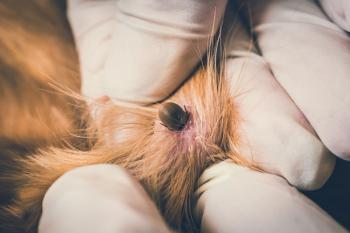
Essential oils for fleas and ticks? Not so fast
Veterinary toxicologist lays out the facts on "natural" parasite prevention products.
Melaleuca oil, from the Australian tea tree, has not been shown effective against fleas and ticks, and it can irritate pets' skin if improperly applied. | Shutterstock.comMost of the time we veterinarians think essential oils are harmless or, at worst, mildly noxious-but is that true? At a recent
D-limonene
D-limonene is derived from orange pulp and has minimal to moderate efficacy to control fleas, Dr. Wismer says. If diluted properly, it has a high margin of safety; if not, it can cause dermatitis, oral irritation, lethargy, vomiting, salivation, ataxia and muscle tremors. This essential oil can penetrate the skin and cause peripheral vasodilation, leading to hypotension and hypothermia.
Melaleuca oil
Melaleuca oil is an essential oil from the Australian tea tree, Melaleuca alternifolia. It does have antibacterial and antifungal properties at higher concentrations, but the products labeled for use in animals are 5% or less, and the efficacy of this agent to repel or kill fleas has not been established, Dr. Wismer says. Inappropriate application of Melaleuca products or products not intended for external use may result in ataxia, weakness, tremors and depression.
Pennyroyal oil
If your clients have been on Dr. Google, they may have read that pennyroyal oil is effective against fleas and ticks. This has not been proven, Dr. Wismer says-but toxicity definitely has. Pennyroyal oil, derived from the leaves and flowers of the pennyroyal plant (also called squaw mint or mosquito plant), contains a volatile compound called pulegone, which is responsible for the plant's toxic effects. If pennyroyal is applied directly to an animal it can cause depression, vomiting, hepatic necrosis, diarrhea, epistaxis, seizures and death. Pennyroyal oil should never be used on animals.
What to do if your patient is exposed
With essential oils, treatment consists of getting the oil off the animal and providing fluids and supportive care, Dr. Wismer says. Keep in mind that if the oils have been applied to irritated or broken skin, the risk of toxicosis is higher due to increased systemic absorption. Bathe the pet in liquid dishwashing detergent, and be aware that most essential oils have long half-lives (days) due to enterohepatic recirculation. Administer appropriate pain control as needed, and monitor liver values in cases of pennyroyal exposure.
Time for the soapbox
It's up to us as veterinary professionals to ask our clients about any essential oil usage on their pets and then counsel them accordingly. If you're reticent (like me) to have these conversations because you think it may damage your relationship with the client, remember this: Fleas and ticks are more than a nuisance. They carry and transmit debilitating and sometimes fatal diseases, some of which are zoonotic. You can tell them that leading experts in our field, like
You. Can. Do. This!
At Fetch dvm360 conference, we're the support system you need. With every conference this year, we intend to nurture your mind (meaning quality CE for days) while also encouraging you to take stock of your physical and emotional health.
Yes, you may run up against some deeply seated beliefs, but use kindness and compassion, and make sure you cover your bases with thorough medical records that document the conversation.
Godspeed, fellow warrior.
Dr. Sarah Wooten works in small animal practice in Greeley, Colorado, speaks on leadership and client communication topics at Fetch dvm360 and other professional events, and contributes frequently to dvm360.com.
Newsletter
From exam room tips to practice management insights, get trusted veterinary news delivered straight to your inbox—subscribe to dvm360.





